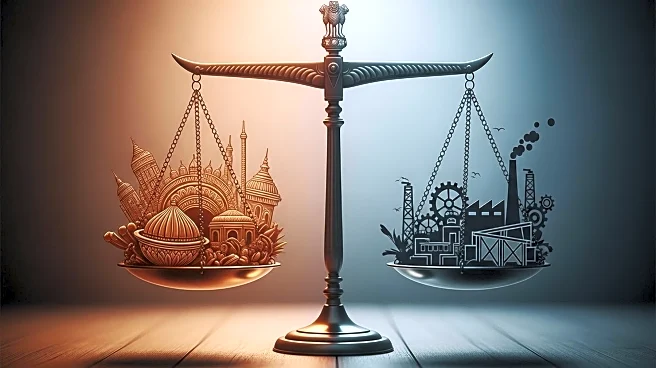What's Happening?
India is facing a complex foreign policy challenge as President Trump criticizes its purchase of discounted Russian oil, accusing the country of supporting Moscow's war efforts. This criticism comes alongside increased tariffs on Indian goods, complicating India's position as it navigates its role in global alliances. India is a member of both the Indo-Pacific Quad, alongside the US, Japan, and Australia, and the Shanghai Cooperation Organisation, which includes China and Russia. This dual membership reflects India's strategic autonomy, allowing it to engage with competing global powers. Despite the rebuke from the US, India continues to buy Russian oil while seeking American investment and technology. The situation is further complicated by India's upcoming participation in the SCO meeting in Tianjin, highlighting its balancing act between different geopolitical interests.
Why It's Important?
The rebuke from President Trump and the imposition of higher tariffs have significant implications for India's foreign policy and economic strategy. As India strives to maintain strategic autonomy, it faces the challenge of balancing relations with major powers like the US, China, and Russia. The criticism from the US could impact India's economic ties and its position in global trade, especially given its reliance on discounted Russian oil for energy security. The situation underscores the delicate balance India must maintain to leverage its position in global alliances without compromising its strategic interests. The broader impact includes potential shifts in diplomatic relations and trade dynamics, affecting industries reliant on international partnerships and investments.
What's Next?
India's foreign policy strategy will likely focus on managing relations with the US while maintaining its ties with Russia and China. The upcoming SCO meeting in Tianjin will be a critical moment for India to navigate its role in the organization and address the geopolitical tensions. Additionally, India's engagement with the I2U2 group, which includes Israel, the UAE, and the US, will be crucial in advancing technology, food security, and infrastructure initiatives. The strategic dialogue with China, amid thawing relations, will also be pivotal in shaping India's diplomatic approach and addressing trade imbalances.
Beyond the Headlines
India's foreign policy approach reflects a broader trend of multipolarity in global politics, where countries seek to engage with multiple power centers to enhance their strategic leverage. This strategy, while offering flexibility, also presents challenges in maintaining consistent diplomatic relations and avoiding conflicts of interest. The situation highlights the complexities of global diplomacy in an era where traditional alliances are increasingly fluid and subject to geopolitical shifts.









